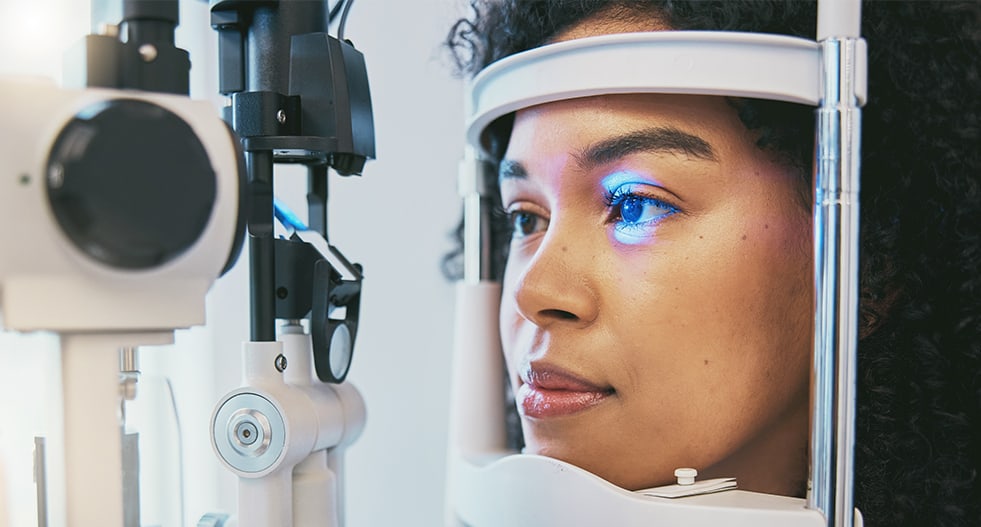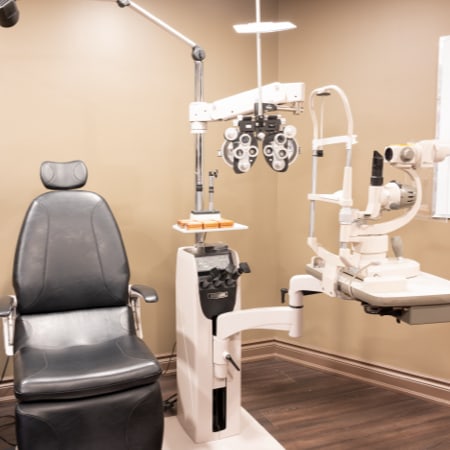Preserving Your Vision & Eye Health
Comprehensive eye exams are the first line of defence in safeguarding your vision. Many eye diseases don’t show any symptoms until they have progressed, so it’s important to monitor your eye health regularly.
During your comprehensive exam, we’ll assess your risk for eye conditions and diseases like age-related macular degeneration and dry eye. We aim to protect your eye health and vision, and once we understand your medical history, we can recommend a personalized examination schedule based on your risk of developing specific eye conditions.
Early detection and treatment are important to slow or prevent vision loss. Your vision is precious, and we’re here to help preserve it. Schedule an appointment today.
Book Appointment
The Importance of Early Detection & Management of Eye Disease
Many serious eye conditions do not have easily noticeable warning signs. Without routine eye exams, those conditions can go unnoticed until they cause vision loss.
Through regular comprehensive eye exams, our team can detect changes to your eyes early. That early awareness of possible issues allows us to prepare a personalized treatment plan to protect your vision and eye health.


The Different Types of Eye Disease
We want to help our patients protect their eye health. Our team focuses on diagnosing and treating a variety of eye conditions. Understanding the different types of eye diseases can help you recognize symptoms, understand your risk, and seek treatment.
When you visit us for an eye exam, we can help you further understand each of these conditions and the effects they could have on your life.
AMD affects the central part of the retina, known as the macula, and is a leading cause of vision loss in older adults. There are 2 types: dry and wet.
Dry AMD progresses slowly and causes blurry vision, while wet AMD can lead to rapid vision loss due to abnormal blood vessels. Regular eye exams are important for early detection and management of AMD.
Glaucoma is a group of eye conditions that damage the optic nerve, often due to increased pressure in the eye. If untreated, it can lead to irreversible vision loss.
There are several types, including primary open-angle and angle-closure glaucoma. Early detection through regular eye exams is important for preventing vision loss from glaucoma.
Diabetic eye disease refers to a group of conditions that can be caused by diabetes, such as diabetic retinopathy. Diabetes can also increase your risk of developing other eye conditions, like cataracts. Regular diabetic eye exams and blood sugar control are important for preventing and managing these conditions.
Uveitis is an inflammation of the uvea, the eye’s middle layer. It can cause redness, pain, light sensitivity, and blurred vision.
Uveitis can be linked to infections, autoimmune disorders, or injuries. Prompt treatment is important for preventing complications from uveitis.
An epiretinal membrane is an eye condition that affects the retina. A thin layer of fibrous tissue forms on the surface of the back of your eye, which can cause blurred or distorted vision.
When changes occur to the vitreous, the gel-like substance that fills the centre of the eye, it affects your vision. As the vitreous shrinks, it pulls away from the retina, which can create an epiretinal membrane.
Surgery may be required to treat an epiretinal membrane. We can help you determine the right course of action for your health and vision.
Cataracts occur when the eye’s lens becomes cloudy, leading to blurred or dim vision. This condition is common in adults over 60 and can affect 1 or both eyes.
The symptoms of cataracts include double vision, sensitivity to light, difficulty seeing at night, and faded colours. During their early stages, you may be able to manage the effects of cataracts with adjustments to your glasses or contacts, but as they progress, cataract surgery may become necessary.
We can advise you on cataract surgery and answer any questions you may have to help you prepare.
Flashes and floaters are tiny specks or flashes of light that appear in your field of vision. While they are often harmless, they can sometimes indicate a serious condition like retinal detachment.
If you experience a sudden increase in floaters or flashes, it’s important to seek immediate medical attention. Retinal detachment can cause vision loss if not treated quickly.
Conjunctivitis (pink eye) is an inflammation of the conjunctiva, the thin membrane covering the eye.
There are 3 types of conjunctivitis:
- Viral conjunctivitis
- Bacterial conjunctivitis
- Allergic conjunctivitis
The symptoms include redness, eye irritation, and discharge. The proper treatment depends on the cause and type of conjunctivitis, and may include antibiotics, antihistamines, or other medications.
Dry eye disease occurs when your eyes don’t produce enough tears or your tears evaporate too quickly. Factors like aging, environmental conditions, and prolonged screen time can contribute to dry eyes.
Dry eye disease can cause several symptoms, including intense discomfort, redness, and water eyes, but those symptoms can be managed and prevented with dry eye therapy.
Keratoconus is a condition where the cornea, the clear front surface of your eye, thins and bulges into a cone shape, causing distorted vision. Keratoconus can progress over time and may be influenced by genetics and environmental factors. Early detection is important in managing this eye condition.
We can help you determine the right options for seeing clearly with keratoconus.
Address Eye Disease Today
At Orillia Optometry, we’re dedicated to providing comprehensive care to help protect your eye health and vision. Schedule an appointment with us today.
Book Appointment












